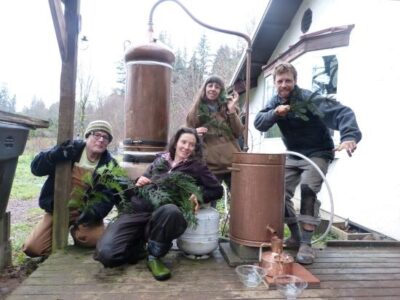Happy farmers with copper still. Photo by Alexia Allen
Years ago, I met with our wonderful farm accountants, who used to run a farm near us—a farm that had big fields of mature lavender plants. Since they were getting out of farming, they had a big copper essential oil extractor for sale. When I saw the graceful curve of the hammered copper contraption, I was hooked. I’m a fan of cool farm gizmos anyway, and this tool puts the steam in steampunk.
Imagine a big round copper cauldron, almost too heavy to lift. That part sits on a propane burner, and is filled with several gallons of water to produce steam. On top of this cauldron is a copper cylinder I can just about wrap my arms around. That cylinder gets filled with plant material, like mint or cedar branches. On top of the cylinder sits the alembic, a curving pipe that sends scented steam through the top and down into the condensing coil that sits in a tub of cold water.
Here in the Pacific Northwest, we’re blessed with abundant rainwater that we run continuously through the condensing tub, and get a stream of warm rainwater coming out. We could, if we were ambitious, set up a hot tub to soak in as the machine works, but for now I just use the warm water to wash horse blankets!
We set up the extractor, stuffed with plants and water, and seal the joints with tape. This process should not smell good, because good smells mean that oils are escaping into the atmosphere instead of being caught where they drip out of the bottom of the condensing coil. After that machine has its joints sealed with tape, I can’t open it until we’re done! I plan a full day for two batches of plant material. Depending on the plant, this means a pint or two of oil from the conifer branches that are our staple material. Once I set everything up and get the propane burner going, I can step back and do other things around the farm – but always with an eye towards anything overflowing or steaming where it shouldn’t.
Oil extraction takes some time, for sure, but we can do it during the winter when we don’t have garden projects and baby goats coming out our ears. We can take a “waste product” like pruned branches and convert them into a non-perishable, high-value product. When I sell hundreds of pounds of produce (which I do), I’ve just sold a lot of nutrients off the farm. When I sell essential oils, I am selling the tiniest tip of the iceberg of all the aromas here. I’m not depleting soils, because the soggy plant materials go out of the extractor and right back to the earth here, often around the trees they came from. In the wintertime, we make essential oil from cedar, juniper Douglas-fir. In the summer, we fit in a few batches of mint and the classic lavender. If friends and neighbors have large quantities of aromatic plants, such as from pruning a giant rosemary or incense-cedar, we take that too.
At first we ran the branches through a small chipper, but that added hours to each session. Now, I put whole twigs right in, and let the steam do the work of breaking down the cell walls. Yes, we get a tiny bit more oil when we grind the plants first—but not enough to account for the extra time it takes to stand in front of the loud chipper.
We were lucky to stumble onto used equipment, and to live in a conifer forest where regular blowdowns give us abundant plant material. There isn’t much information out there about essential oil extraction, so we are discovering as we go. The process strikes a chord with my mad-scientist-botanist self, and has given our resilient farm an income stream that fits well into our yearly routines. A significant bonus is that we have all the essential oil we want for our wood-fired sauna, but that’s a story for another day. Enjoy the smells of the season, wherever you are!
Alexia Allen is a farmer, teacher, and homestead orchestrator at Hawthorn Farm in Western Washington State. She taught at Wilderness Awareness School for 12 years before moving into farming full-time and enjoys a Renaissance woman life with something new every day of every season. Read all of Alexia’s MOTHER EARTH NEWS posts here.
All MOTHER EARTH NEWS community bloggers have agreed to follow our Blogging Guidelines, and they are responsible for the accuracy of their posts.




